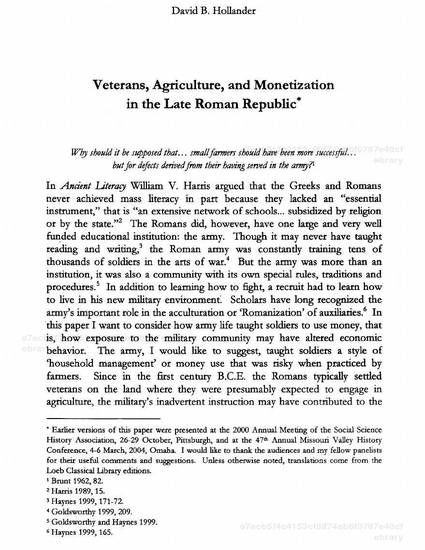
Contribution to Book
Veterans, Agriculture, and Monetization in the Late Roman Republic
A Tall Order: Writing the Social History of the Ancient World. Essays in Honor of William V. Harris
Document Type
Book Chapter
Publication Date
11-1-2005
Abstract
In Ancimt Literaq William V. Harris argued that the Greeks and Romans never achieved mass literacy in part because they lacked an "essential instrument," that is "an extensive netwotk of schools ... subsidized by religion or by the state."2 The Romans did, however, have one large and very well ~ded educational institution: the army. Though it may never have taught reading and writing,3 the Roman anny was constantly training tens of thousands of soldiers in the arts of war.4 But the anny was more than an institution, it was also a community with its own special rules, traditions and procedures. 5 In addition to learning how to fight, a recruit had to learn how to live in his new military environment: Scholars have long recognized the anny's important role in the acculturation or 'Romanization' of auxiliaries.6 In 'this paper I want to consider how anny life taught soldiers to use money, that is, how exposure to the military community may have altered economic behavior. The army, I would like to suggest, taught soldiers a style of 'household management' or money use that was risky when ptacticed by fanners. Since in the first century B.C.E. the Romans typically settled veterans on the land where they were presumably expected to engage in agriculture, the military's inadvertent instruction may have contributed to the political and economic difficulties of the age, particularly debt crisis.
Copyright Owner
De Gruyter
Copyright Date
2005
Language
en
File Format
application/pdf
Citation Information
David B. Hollander. "Veterans, Agriculture, and Monetization in the Late Roman Republic" A Tall Order: Writing the Social History of the Ancient World. Essays in Honor of William V. Harris (2005) p. 229 - 239 Available at: http://works.bepress.com/david_hollander1/1/

This is a book chapter from A Tall Order: Writing the Social History of the Ancient World. Essays in Honor of William V. Harris (2005): 229, ISBN: 3598778287. Posted with permission.